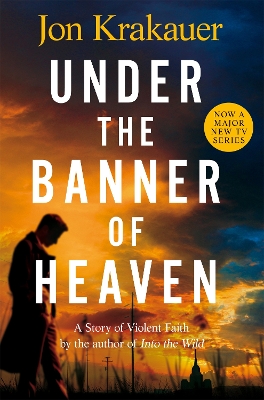The current, mainstream LDS reaction to church history is usually to claim that most accurate tellings of the founding of the Mormon religion are 'anti-Mormon' literature. They actively discourage members from delving too deeply into any historical research. Recently, however, with the publishing of official essays on Church history, they have attempted to address these issues in a world where information is increasingly right at our fingertips.
What really struck me about Jon Krakauer's Under the Banner of Heaven was his complete lack of judgement. When writing about a double murder, child abuse, spousal abuse, and religious fundamentalism, it's easy to become emotional and angry in your writing style. Krakauer, however, remains an impartial writer, presenting the facts as they appear, whether it be from the mouth of the victims or the perpetrators. Even Mormon history he offers as a matter of fact, rather than lending any emotional indignation to the founding of the LDS church. The early Mormons do not come across as blameless in some of the atrocities they perpetrated in the founding of their church, but then neither do the early Americans, who committed equally horrendous crimes against the Mormons. I found it quite refreshing. These topics can be quite emotionally charged.
What really struck me, was how Krakauer just understood what was relevant, and conveyed it in a way that can appeal to every reader. He understands what it is to be driven by faith and does not judge it. He also understands the pain and emotional trauma that comes with leaving one's faith. But where this book really shines is in its study of the rationality of faith. To outsiders, the Lafferty murders seem to be the product of madness. Two men truly believe, without regret, that they were instructed by God to kill a woman and her baby. When it comes to prosecuting, however, it raises all kinds of question about madness vs. belief. Just because faith turns violent, does that make it a product of insanity? And if you apply insanity to it does it then, by extension, mean that all religious faith is a product of insanity? When is faith mad, and when is it rational? Neither I nor this book professes to have those answers.
“How can a society actively promote religious faith on one hand and condemn a man for zealously adhering to his faith on the other?”I can't recommend this book highly enough. It was deep, truthful, thoughtful and for me at least, highly personal.
I will leave you with the parting words of a fundamentalist apostate. Like so many of us who leave our faiths, we go through a period of questioning, confusion, and indeed, unhappiness while we find ourselves in a world that essentially has a far different reality to the one in which we grew up. “But some things are more important than being happy. Like being free to think for yourself.” To all of you struggling with your faiths out there, I promise, the unhappiness of uncertainty will pass. The ability to think for yourself is well worth the uncertainty you will face.
